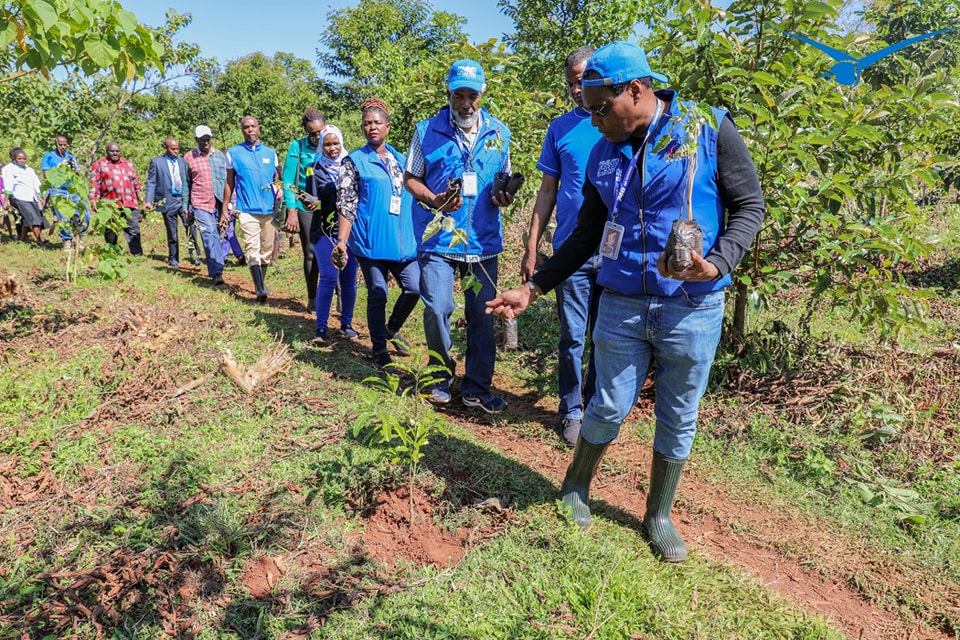Renowned airline, 748 Air Services has affirmed its commitment to the achievement of carbon neutrality as it embarks on tree planting to compensate for its carbon emissions. This comes amidst initiatives that are pushing for lower carbon footprints.
According to 748 Air Services Managing Director, Moses Mwangi said the airline is set to boldly and aggressively seek proactive ways of playing in the front row of addressing climate change in the country.
“We recognized in aviation we are burning a lot of fuel, so our footprint is heavy, and felt that it’s our duty to come back to the community and make sure we have a way that we can offset carbon. We need to reduce it, we have no question about it,” said Mwangi.
748 Air Services is among the first airlines to pilot a United Nations scheme that tests how much carbon airlines release during flights and comes up with profiles that reduce the burning of fuel. This is on how you fly, taxiing -a movement of an aircraft on the ground, under its own power, among other things to reduce the carbon footprint.
“ We are very proud because this was later adopted worldwide, from it we can see a reduction, especially from our company where we are able to save 10% and 15% of the fuel burn, which amounts to tens of tonnes of carbon per year,” said Mwangi.
Mwangi spoke during the annual tree planting exercise organized by the Kakamega Forest Heritage Foundation and follows its 2022 plans to begin offsetting its carbon emissions in 2023 to compensate for an equal amount of tonnes of CO2 its aircraft are emitting.
“If we can now plant these trees to maturity we will see them take up more carbon from the atmosphere.”
748 Air Services Environment Manager, George Oduor said while Humanitarian aviation has been exempted from carbon offsetting, the airline is committed to sustainable development goals.
“As a policy from top management 748 air services is a responsible corporate firm,” said Oduor.
The International Civil Aviation Organisation (ICAO), has set 2026 as the deadline for countries to start mandatory compliance with carbon emission reduction requirements for international aviation.
International Energy Agency data shows aviation accounted for over 2% of global energy-related CO2 emissions in 2021, saying airline emissions have grown faster in recent decades than road, rail, or shipping.
“We have voluntarily gone into this to ensure that we come up with programs that will take back carbon emissions from our operations. Kakamega is just but the start, there are many other projects that are in line including our internal operations to ensure we either minimize, reduce, or where possible offset,” said 748 Air Services Head of Quality, Safety, and Environment, Maurice Juma.
This year indigenous trees covering 7 acres were planted at Kakamega Forest in sustained efforts to reduce carbon footprint and restore the forest. The Foundation has so far planted over 29,000 seedlings since 2018 to rehabilitate Kakamega Forest.
“We have managed to cover 62 acres so far and we are calling upon other individuals, institutions, corporates, and community-based organizations to support initiatives that green our country,” said Kakamega Heritage Member, Hannington Kimathi.
Kenya’s current tree cover now stands at 12.13% out of the target of 30% by 2032, meaning the country needs to plant 15 billion trees over the next ten years or 1.5 billion trees annually to hit the target.
Prime Cabinet Secretary, Dr. Musalia Mudavadi, called on sustained tree planting and community sensitization and mobilization efforts across the country to counter man-made forest destructions and the resulting impacts of climate change.
“Though we appear to have met the constitutional 10% forest cover, my hunch is we should do better than that. We are moving two steps forward and one step backward. This is because our effort at increasing forest cover is checkmated by persistent environmental destruction of trees for charcoal burning, and instances of unlawful Shamba System,” Said Mudavadi.

